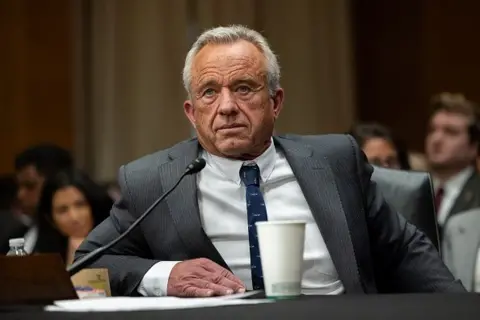Senate confirms Tulsi Gabbard as national intelligence director
Tulsi Gabbard, one of President Donald Trump's most controversial cabinet picks, was confirmed as director of national intelligence by a narrow vote in the Senate on Wednesday.
The former Democratic congresswoman was approved to oversee the US spy agencies by a Republican majority, with a vote of 52-48. Former Senate Majority Leader Mitch McConnell, a Republican, joined Democrats in voting against her confirmation.
Gabbard's nomination process was rocky, and at times she seemed at risk of losing valuable Republican votes, mostly due to her lack of experience in intelligence.
Her confirmation marks another cabinet victory for Trump as the Senate moves swiftly to confirm his remaining nominees.
Gabbard had cleared a key hurdle on Monday when Senate Republicans came together to invoke cloture - a procedural measure taken to move toward a final vote.
This triggers a 30-hour period for debate. Democrats have been utilizing the full 30 hours to protest Trump's nominees, and his policies, on the floor of the Senate. That meant that the full chamber could not vote on Gabbard's confirmation until the first few hours of Wednesday morning.
After her approval, Senate Republicans are expected to invoked cloture on another controversial pick, Robert F Kennedy, Jr, for health secretary. The final vote on his nomination, then, would come early Thursday.
As director, Gabbard will oversee 18 intelligence agencies including the CIA, FBI and National Security Agency (NSA) and manage a budget of more than $70bn (£55bn).
Trump tapped the military veteran for her "fearless spirit", he said in a statement, in line with several of his other cabinet picks who he sees as disrupting the Washington establishment.
But the former Democrat stands out as one of Trump's most disputed nominees.
She was widely expected to face Democratic opposition, but she also lost the vote of McConnell, a key Republican figure. Following the vote, McConnell said in a statement that he felt she was unqualified for the role.
"In my assessment, Tulsi Gabbard failed to demonstrate that she is prepared to assume this tremendous national trust," he said. "The nation should not have to worry that the intelligence assessments the President receives are tainted by a Director of National Intelligence with a history of alarming lapses in judgment."
Gabbard faced a contentious confirmation hearing before the Senate Intelligence Committee at the end of January where committee members grilled her on past comments about government whistleblower Edward Snowden, her views on the government's surveillance authority and her relationships with Russian President Vladimir Putin and Syria's former dictator Bashar al-Assad.
During one heated exchange, lawmakers repeatedly pushed Gabbard to answer whether she considered Snowden - who leaked classified documents alleging the US was conducting illegal surveillance - a traitor to the US. Gabbard had previously called him "brave" and argued he should be pardoned for his crimes.
She refused to give a "yes" or "no" answer, raising scepticism among some Republicans.
But it wasn't enough to deter their votes. She later passed a committee vote along party lines.
After her failed bid for president in the 2020 election, Gabbard turned into one of Trump's most loyal backers. She left the Democratic party in 2022 and registered as an independent, and then became a contributor on Fox News where she was an outspoken Trump supporter.
She endorsed Trump several months before the election and officially joined the Republican party last October.
 Getty Images
Getty ImagesThe Republican-led Senate has been working to quickly confirm all of Trump's cabinet picks.
Kennedy will face similarly tight margins after his nomination also seemed in peril.
His past anti-vaccine views had angered Democrats, while his history of changing his stance on abortion had troubled some Republicans.
